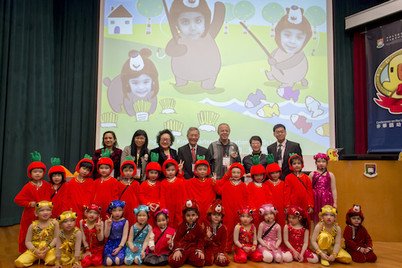Language Help for Ethnic Minorities
More than 45,000 South Asians live in Hong Kong, including children and teenagers who attend local schools. Cantonese generally is not used in their homes. As these students progress through the school system, their language limitations restrict their opportunities for jobs and further education.
More than 45,000 South Asians live in Hong Kong, including children and teenagers who attend local schools. Cantonese generally is not used in their homes. As these students progress through the school system, their language limitations restrict their opportunities for jobs and further education.
To help this group, the Centre for Advancement of Chinese Language Education and Research (CACLER) of the Faculty of Education has been involved in 20 projects to provide materials, teacher training and other services to improve the skills and prospects of non-Chinese speaking students.
"These students are disadvantaged in society but in fact some of them have proven to be excellent students," said Dr Mark Shum, who is a member of the team spearheading this work. "They are able to get into some of the top secondary schools in Hong Kong. They have only one limitation, which is their Chinese language skills."
The team of six principal investigators started working on these projects in 2006, after the issue came to public attention and earmarked funding from the government became available. Over the years, it has provided research-based professional training and development to teachers, guidance on curriculum development, in-class assessments of teaching, books and related materials, and other resources so that teachers can better support these students.
"The Chinese proficiency of 'these students' varies enormously, and the teachers may not be experienced or may not know how to tailor materials in the curriculum for them. We provide that training," team leader Professor Shek Kam Tse said.
The team has also organised after-school Chinese classes for secondary school students, and produced information for parents on how they can support their children.
More than 3,500 secondary school students, 500 primary school students and 1,000 pre-primary school students, and their parents, have participated in the project and the results are encouraging. For instance, secondary school students' knowledge of characters and written vocabulary improved following intervention, as did reading comprehension.
The team has held four international conferences to share its expertise and experience with others in the community and the world, and is developing Chinese-language learning materials for schools regionally and internationally. It also launched a Master of Education programme on teaching Chinese to non-Chinese speakers.
"Learning how to teach non-Chinese speaking students is not only a local question but a global concern because of the economic growth of China. We want to share our experience with people around the world and be a hub of teaching Chinese as a second language in the Asia-Pacific," Dr Elizabeth Loh said.
Professor Shek Kam Tse and team members, Dr Mark S. K. Shum, Dr Wing Wah Ki, Dr Wai Ming Cheung, Dr Joseph W. I. Lam and Dr Elizabeth K. Y. Loh, received the Faculty Knowledge Exchange Award 2014 of the Faculty of Education for 'A Meaningful Journey of Teaching and Learning of Chinese for Non-Chinese Speaking Students: Towards Local, Regional and International Advancement'.


